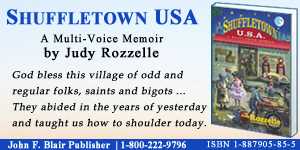It is the Holiday Season, lighting even the darkest heart. Homes and businesses sparkle, wishing the merriest of seasons. Lights jump and blink, dancing past car windows beaming hope into December nights. Window panes glow, and dark streets are transformed.
Sometimes, we forget that these are the darkest nights of the year. This is when nature rests and Demeter grieves for her lost daughter. In the time before history, this was the season of the Winter Solstice when nights were as indelible as black ink and where shadows live unseen. Only the Druid Priests commanded the night sky, to the farmers the night sky was a dark mystery ruled by the moon.
Legend and lore tells us of the Pagan Mid-Winter festivals during the middle ages and before. But, within this darkest December night, deep within the earth, spring is waking from a winter’s slumber.
My story is of another time, when the Carolina backcountry was America’s first frontier. This backcountry was so wild and wooly that the pioneer settlers slept in fits and jerks. They knew that danger was only a shadow, an arm’s length away.
My story is a sacred tale written for the brave and the faithful who came to North Carolina when it was a wilderness. The Piedmont, the Carolina backcountry, was unknown and uncharted. The Catawba River was home to the bear and jaguar and the homes of the Tuscarora, the Cherokee, and the Catawba Indian tribes. The Carolina backcountry was the end of civilization. Still, the pioneers came with pockets filled with dreams.
In the fall of 1752, Brother Joseph Spangenburg set out with several other Moravian Brethren leaving Bethlehem, Pennsylvania, to search for a place in North Carolina to build a Moravian settlement.
Almost fifty, Brother Joseph was portly with a kind face, and a bald head, but he wise in wilderness ways and held to unswerving faith that God would guide his journey. Brother Joseph had several opportunities to misplace his faith when they became lost and spent the winter in the mountains around Blowing Rock.
It was spring when the men entered the area known today as Winston-Salem, here Brother Joseph found his Promised Land. He named the area Wachovia in honor of a place in Germany where the Moravian Church, a Protestant sect called the United Brethren, had first found refuge. Here, they would build a village and name it Bethabara, House of Passage. They first arrived in groups of fifteen or twenty, they came as guardians.


